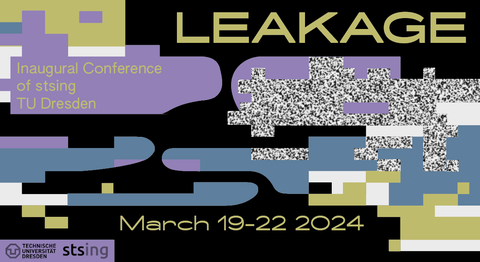Mar 20, 2024
NOW: Science & Technology Studies @ TU Dresden | Leakage: Inaugural Conference of stsing | 250 Presenters, 21 Countries. March 19-22
Leakage: Inaugural Conference of stsing e.V.
TU Dresden, March 19-22
Keynotes:
Nerea Calvillo (University of Warwick)
Aeropolis or the Words of Leaking Air
Amade M'charek (University of Amsterdam):
Percolating Presence and the Politics of Neglect: Trailing Life and Death in a Postcolonial Landscape
Thao Phan (Monash University)
Listening to misrecognition
Public Artistic Event in collaboration with Schaufler Lab and Technische Sammlungen Dresden (March 21, 19:00):
LEAKY EARTH. Multi-Mediations of a Planet in Transformation
with Rosa Barba & Kat Austen with live visuals from Dongjoo Seo
Link to Conference Program
Conference Description
Leakage reveals cracks and holes; it signifies porosity, the transgression of a boundary, and a rebuke to fantasies of closure and containment. Unlike a sudden spill or a violent burst, leaks are sites of a slow and steady subversion. They corrode and accumulate over time, calling for a reckoning with temporalities of latency and a readjustment of perceptual scales. Leaks are evidence of hidden complexity and unacknowledged others, both human and nonhuman. They draw attention to the material unconscious, submerged histories, and enabling conditions of cities, bodies, ecologies, technologies, and social systems.
Whether through the registers of excess, loss, abjection, entropy, or sacrifice, leakage can be understood as that which cannot be contained by hegemonic economies of distribution and circulation. Something seeps through that should have stayed behind walls, cordoned off to prevent contamination, mixture, or mediation. Sites of leakage are paradigmatic for the environmental and social costs of resource industries and extractive colonialism but also create liminal zones where ecologies and architectures intermingle. Integral to challenges of bounded individualism in critical disability studies and material feminisms, conceptions of leakage articulate bodies and systems open to the contingencies of environmental exposure and socio-technical enmeshment. Framed by critical data and security studies, leakage speaks to the intersections of surveillance capitalism, digital justice, and hacking. Leaks disturb and redistribute regulated flows of matter, capital, information, and power; they create diversions and bifurcations with nonlinear, unpredictable, and protracted effects. From toxic spills to data leaks, leakage is inherently political. The politics and materialities of leakage raise questions about vulnerable and permeable ecologies, architectures, technologies, bodies, and knowledge systems. Fears of leakage—leaky bodies, leaky pipes, leaky borders, leaky servers, leaky arguments—reinforce regimes of hygiene and security that are quick to produce a techno-social fix or reactionary containment strategy. At the same time, leakage can be leveraged as both an instrument of geopolitical violence and a counter-hegemonic tactic of generative disruption and emancipatory disclosure.
Thinking with leakage promotes a shift in analytical gears and new alliances across disciplines and reference fields. What would a generative politics of leakage look like it? How might an engagement with leakage inform a critical analysis of black boxing, colonial infrastructuralism, spatial design, hetero-patriarchal biopolitics, or technoscientific worldmaking? Who and what is feeding (on) the leak, and what emerges in its wake? Engaging leakage through the lens of science & technology studies (STS) requires self-reflexivity about epistemic instabilities, interdisciplinary diffusion, and unintended consequences. We invite scholars, activists, and artists to defamiliarize, disrupt, or otherwise explore the generative potential of leakage as a variegated paradigm for STS, whether engaged as a physical phenomenon, a material metaphor, an analytical tool, or a political strategy.
Organizing Team:
Sandra Buchmüller, Michaela Büsse, Kristiane Fehrs, Moritz Ingwersen, Anja H. Lind, Johanna Mehl, Judith Miggelbrink, Michelle Pfeifer, Susann Wagenknecht
Chair of Micro-Sociology and Techno-Social Interaction
Chair of North American Literature and Future Studies
Chair of Human Geography
Chair of Digital Cultures
Chair of Thermodynamics

